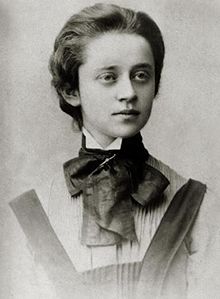Sofija Yakovlevna Parnok
Sophia Parnok ( Russian София Яковлевна Парнок , scientific. Transliteration Sofija Jakovlevna Parnok , sometimes Sophia , Sofia , Sofya or Sofya ; born July 30, jul. / 11. August 1885 greg. In Taganrog , † 26 August 1933 in Karinskoje , Moscow Oblast ) was a Russian poet and translator, sister of the poet Valentin Parnach and the children's writer Yelisaveta Tarachowskaja .
life and work
Sofija Parnok came from a Jewish pharmacist family in Taganrog. She attended the Taganrog Maria Girls ' High School from 1894 to 1903 , traveled to Europe , studied at the Geneva Conservatory , but returned to Taganrog in 1904 due to a lack of money. She began her studies at the St. Petersburg Conservatory at the end of 1904, broke off her studies and went back to Geneva, where she gained her first experience as a playwright with the play The Dream . In June 1906 she returned to Taganrog. In 1907 she married Vladimir Wolkenstein and moved to Saint Petersburg. In January 1909 Parnok divorced him and moved to Moscow .

At the beginning of the First World War , she met the young poet Marina Tsvetaeva , with whom she was drawn into a passionate love affair that left significant traces in the poetry of both women. Parnok's first late book of poems , Poems , appeared shortly before they broke up in 1916. The poetry of the poems deals with lesbian love for the first time in Russian poetry without associating it with decadence.
Parnok left Moscow in the late summer of 1917 and spent the civil war years in the city of Sudak on the Crimean peninsula . There she wrote one of her masterpieces, the dramatic poem and libretto for an opera in 4 acts by Alexander Spendiarjan , Almast , which caused great excitement in the Bolshoi Theater in Moscow in 1930 and in Odessa , Tbilisi , Tashkent , Yerevan and Paris (1952) cared.
Sofija Parnok is the author of the poetry collections Pieria-Rosen (1922), Die Weinrebe (1923), Musik (1926) and Klangvoll (1928). The Soviet censors declared Parnok's poetry "illegal" and after 1928 it was no longer allowed to be published. She has translated poems by Charles Baudelaire as well as texts by Romain Rolland , Marcel Proust , Henri Barbusse and others.
Parnok was close friends with Olga Nikolajewna Zuberbiller and Nina Evgenjewna Wedenejewa .
Parnok died of a heart attack in Karinskoje near Moscow in 1933 and was buried in Moscow's Vvedenskoye cemetery . Her first collection of poems appeared at the end of the 1930s, published by the Soviet publishing house.
literature
- Diana Lewis Burgin: Sophia Parnok . The Life and Work of Russia's Sappho [Biography]. New York University Press , New York, NY 1994, ISBN 0-8147-1190-1 (English).
- Joey Horsley, Luise F. Pusch: women stories . Famous women and their friends. Wallstein, Göttingen 2010, ISBN 978-3-8353-0634-9 .
Web links
- Diana Lewis Burgin: Sophia Parnok and the Writing of the Lesbian Poet's Life , accessed August 11, 2010
- Sofija Yakovlevna Parnok. In: FemBio. Women's biography research (with references and citations).
| personal data | |
|---|---|
| SURNAME | Parnok, Sofija Jakowlewna |
| ALTERNATIVE NAMES | Парнок, София Яковлевна (Russian) |
| BRIEF DESCRIPTION | Russian poet and writer |
| DATE OF BIRTH | August 11, 1885 |
| PLACE OF BIRTH | Taganrog , Russian Empire |
| DATE OF DEATH | August 26, 1933 |
| Place of death | Karinskoye , Moscow Oblast , Soviet Union |
